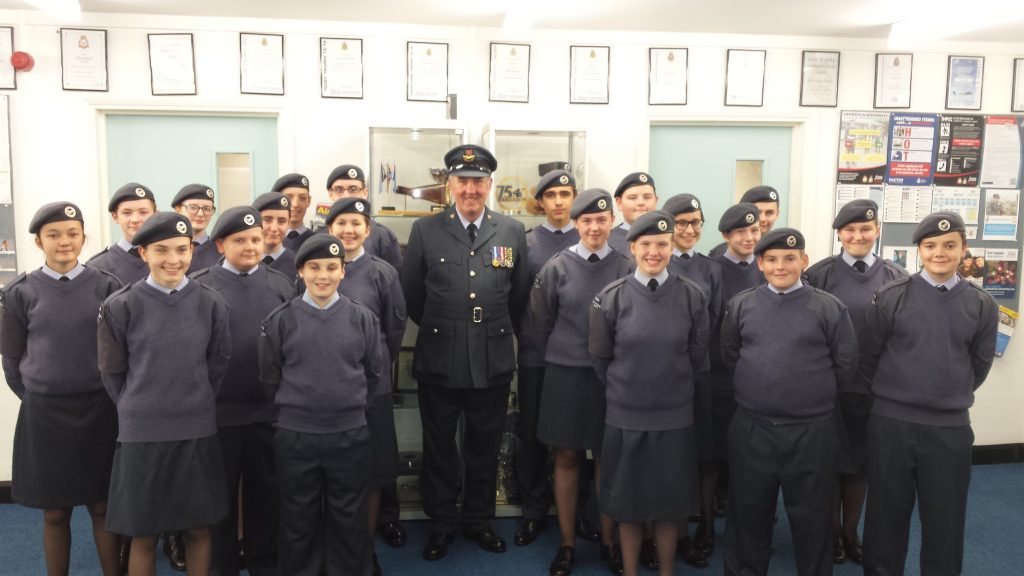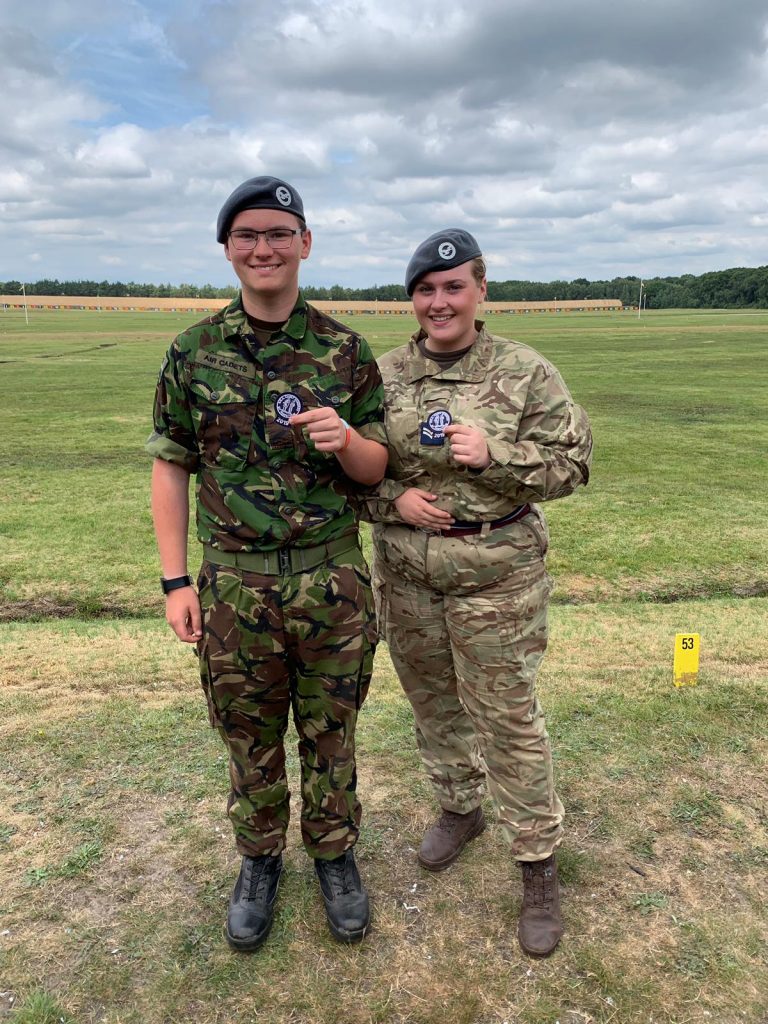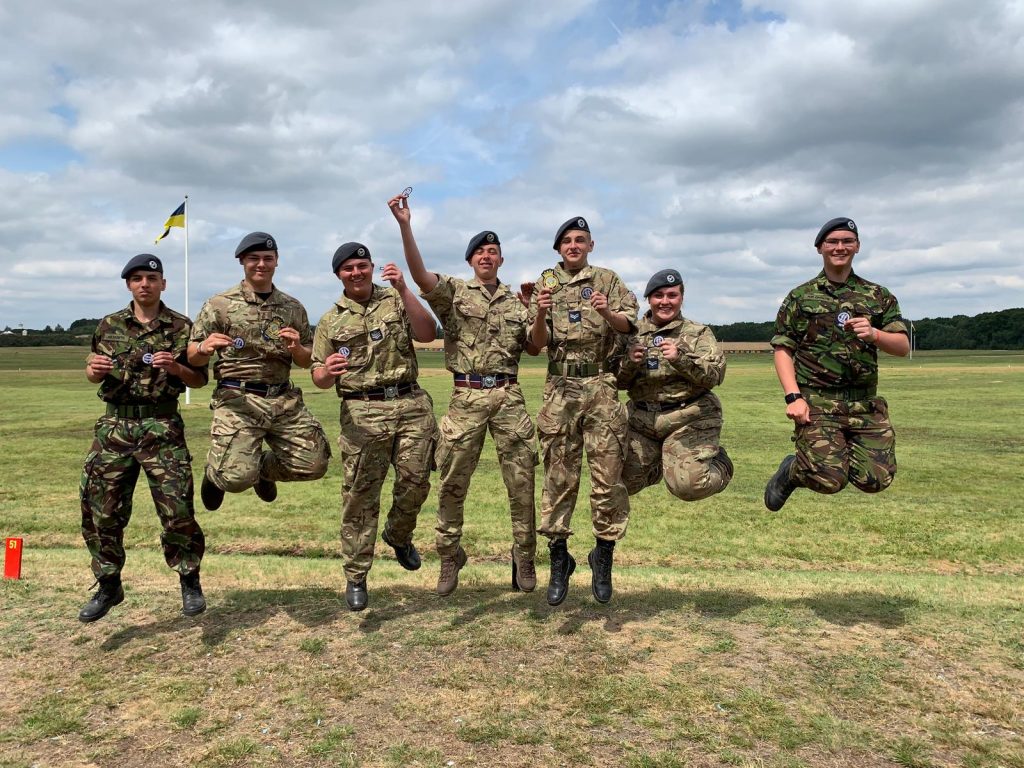C is for… Classification Training, Cyber, Carnival and Cadet 100!
Our social media feeds quite often focus on the wide array of weekend activities on offer, but now is a chance to look at some of the essential training which is delivered on a parade night. When you first join the squadron, you begin as a Junior Cadet. At this stage you begin to learn about the Air Training Corps (ATC), the Royal Air Force and Security. There will be an element of basic drill which will allow you to receive your uniform and you will be enrolled as a member of the ATC. From here, you work towards your First Class Badge, completing sessions on History of Flight, Initial Expedition Training, Map Reading, Airmanship and Basic Radio Communications. Upon completion of your First Class Logbook you will be presented with your badge and certificate. During this time you may also have received other badges, such as a first aid, shooting or radio badge.

Progression from here moves away from a paper logbook into more formal sessions, concluding with an online check of understanding which has a minimum pass mark. You first work towards Leading Cadet, completing Basic Navigation, Principles of Flight and Airmanship 2, before working towards Senior Cadet. At this point you must complete three out of a selection, which includes: Air Navigation, Pilot Navigation, Satellite Communications, Jet Engine Propulsion, Airframes, Piston Engine Propulsion, Aircraft Handling, Air Power and Military Aircraft Systems. Once you pass three, and achieve Senior Air Cadet, you select another three from the same list to take at Master Air Cadet Level. This concludes the classification syllabus, but is not the end of the road. From here, suitable candidates can complete the Cadet Method of Instruction Course (CMOI) and work towards becoming an Instructor Cadet. Instructor cadets receive a yellow lanyard to indicate they have completed sufficient training to allow them to teach other cadets, taking responsibility for their development and progression. Although these sessions may initially sound daunting, they are completed in small groups to allow everyone the opportunity to learn and develop, with teaching styles tailored to the individual learners needs. The sessions are made to be interactive and the knowledge gained throughout is also used within activities, such as navigation within the Duke of Edinburgh Awards (covered in next week’s article!)

It is not only during classification training that cadets have the opportunity to learn and develop, they can also gain new skills during projects and weekend activities. In the 21st century technology is ever changing and in order to remain safe when using it, cadets are taught about staying safe online in Cyber sessions. These occur at four levels throughout the ATC – Blue, Bronze Silver and Gold. This allows for progression throughout a cadets time with the organisation, allowing knowledge to be developed and sustained.

Outside of parade nights, weekend activities can also include fundraising for the squadron. Being a charitable organisation, donations to the squadron funds are always appreciated to assist in giving cadets the best experience possible. Last month the squadron had a stall at the annual Seaham Carnival event, this year running a tombola in addition to selling plants and cans of pop. The cadets also used the stall as a recruitment tool, handing out leaflets and answering any questions. Overall, the cadets raised £265.05 from both the sale of items on the stall, as well as donations. Thank you for all who supported the squadron.

Finally, the squadron always likes to celebrate success. This year at the annual Inter Service Cadet Rifle Meeting (ISCRM) held at Bisley in July each year, Cadet Stewart, Cadet Cooper and Corporal Bell represented the squadron in the L81 Target Rifle Shooting competition. Cadet Stewart achieved a Gold Competition Marksman for his efforts, with Cadet Cooper and Corporal Bell achieved Cadet 100’s. This is a badge awarded to the top 100 shooters each year and is a coveted accolade. Well done to all three cadets on their achievements.


Do you fancy getting involved in any of these activities? Are you up for fun, adventure, incredible experiences and making new friends? Aged between 12 (and in year 8 ) and 17? JOIN AIR CADETS. We are recruiting now, send us a message to find out more and join us next week as we continue our #WhatWeDoWednesday articles.
Durham Northumberland Wing Air Cadets
North Region – Royal Air Force Air Cadets
Commandant Air Cadets
